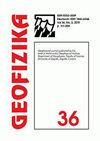2020年3月22日萨格勒布地震后通过社交媒体的公众反应和教育宣传
IF 1.1
4区 地球科学
Q4 GEOCHEMISTRY & GEOPHYSICS
引用次数: 3
摘要
2020年3月22日,克罗地亚萨格勒布附近发生里氏5.5级地震后,市民对地震越来越感兴趣,大量同时访问的游客导致载有克罗地亚地震调查局地震报告的网页崩溃。为了纠正这种情况,地震学家利用社交网络账户提供信息,利用这个机会教育公民有关地震学、地震防备和发生地震序列的基本概念。公民的反馈有助于改善沟通,但需要广泛的节制。2020年7月,萨格勒布大学理学院地球物理系的三名地震学家、斯洛文尼亚环境署的一名地震学家和克罗地亚天主教大学的一名心理学家进行了一项民意调查,以了解公民最常使用的信息来源、他们对地震的了解以及他们因地震而经历的恐惧程度。大多数受访者依赖机构信息来源,与地震前相比,他们对地震防备不同方面的知识相对增加。大多数受访者在主震当天非常担心,主要是因为他们担心可能发生的更强烈的事件,担心自己和亲人的安全。本文章由计算机程序翻译,如有差异,请以英文原文为准。
The public response and educational outreach through social media after the Zagreb earthquake of 22 March 2020
Following the 22 March 2020 ML 5.5 earthquake near Zagreb, Croatia, the citizens became increasingly interested in earthquakes and the multitude of simultaneous visitors caused the webpage with Croatian Seismological Survey reports on earthquakes to crash. To remedy the situation, seismologists used social network accounts to provide information, using the opportunity to educate the citizens on basic concepts of seismology, earthquake preparedness and the occurring seismic sequence. Citizens’ feedback was useful to improve the communication, but required extensive moderation. In July 2020, three seismologists from the Department of Geophysics, Faculty of Science, University of Zagreb, one from the Slovenian Environment Agency, and a psychologist from the Croatian Catholic University conducted a poll to find out which sources of information citizens mostly use, their knowledge about earthquakes, and the level of fear they were experiencing due to the earthquakes. Most respondents relied on institutional sources of information and their knowledge on different aspects of earthquake preparedness increased relatively compared to the time before the earthquake. The majority of respondents was extremely worried on the day of the mainshock, predominantly because they were concerned of a possible stronger event, their safety and the safety of their close ones.
求助全文
通过发布文献求助,成功后即可免费获取论文全文。
去求助
来源期刊

Geofizika
地学-地球化学与地球物理
CiteScore
1.60
自引率
0.00%
发文量
17
审稿时长
>12 weeks
期刊介绍:
The Geofizika journal succeeds the Papers series (Radovi), which has been published since 1923 at the Geophysical Institute in Zagreb (current the Department of Geophysics, Faculty of Science, University of Zagreb).
Geofizika publishes contributions dealing with physics of the atmosphere, the sea and the Earth''s interior.
 求助内容:
求助内容: 应助结果提醒方式:
应助结果提醒方式:


